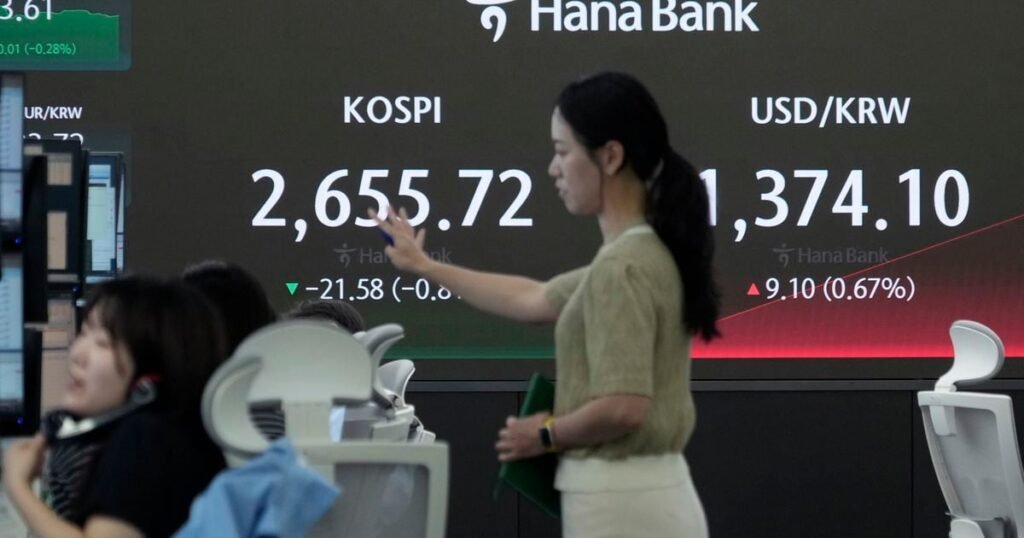Australia’s S&P/ASX 200 fell 0.4% to 7,632.10, while Seoul’s KOSPI lost 0.9% to 2,652.98.
Taiwan’s Taiex fell 0.8%.
“More-than-expected and robust global inflation appears to be draining asset markets’ energy,” Mizuho Bank said in a commentary. “In other words, the ‘Goldilocks’ streak is crumbling. Concerns are also spreading about the negative impact of rising interest rates on demand.”
The S&P 500 fell 0.7% to 5,266.95 on Wednesday, paring a May gain that had put it on track to hit its highest close since November. Four of the index’s five components were down.
The Dow Jones Industrial Average fell 1.1% to 38,441.54, and the Nasdaq Composite Index dropped 0.6% to 16,920.58 after hitting a record high.
American Airlines Group Inc. led airline stocks lower after it cut its outlook for spring profit and other financial targets. The company said fuel costs may be slightly lower than previously thought, but key earnings trends are likely to be lower as well. Shares fell 13.5%.
ConocoPhillips fell 3.1% after it said it would buy Marathon Oil in an all-stock transaction valuing the company at $22.5 billion, including $5.4 billion in net debt. The deal is the latest in a string of recent big acquisition announcements in the industry. Marathon Oil rose 8.4%.
Advance Auto Parts saw its shares fall 11% after its latest quarterly earnings and revenue fell slightly below analysts’ expectations.
Further increases in longer-term Treasury yields also weighed on the stock market, with the 10-year Treasury yield rising to 4.61% from 4.54% late Tuesday following an auction of $44 billion in seven-year notes.
The yield on the 10-year Treasury note is still falling this month, but it has been gradually rising since it dipped below 4.40% in mid-May. Rising Treasury yields push down the prices of all kinds of investments.
The swings in yields this month also came as traders recalibrated expectations for when the Federal Reserve will start cutting its key interest rate, which is at its highest in more than two decades.
Stubbornly high inflation has forced traders to postpone overly optimistic predictions about rate cuts multiple times this year.
The Fed is trying to strike a balance between squeezing the economy with interest rates high enough to completely contain inflation, but not so much that it leads to widespread layoffs.
The Fed said in a report released Wednesday that it has heard from businesses and stakeholders across the country that consumers are opposed to further price increases, which has resulted in insurance premiums and other costs continuing to rise and squeezing companies’ profits.
Despite concerns that cracks are appearing in spending among U.S. consumers, particularly lower-income earners, economists at BNP Paribas expect a healthy job market, slowing inflation and even gains from some cryptocurrency investors to bolster the economy’s main engine.
U.S. stocks continue to hit record highs despite concerns about interest rates remaining high, in part because artificial intelligence technology stocks continue to rally. Nvidia’s latest eye-popping earnings report helped add to the enthusiasm. The company fell briefly in morning trading but ended Thursday up 0.8%, its most modest gain since the earnings report.
Dick’s Sporting Goods Inc. was a winner on Wall Street, sending shares up 15.9% after its most recent quarterly profit and sales beat analysts’ expectations. The company also raised its full-year profit forecast.
Chewy, the online pet supplies retailer, similarly reported better-than-expected profits for its latest quarter, sending its shares up 27.1%.
Meanwhile, benchmark U.S. crude rose 11 cents to $79.34 a barrel in electronic trading on the New York Mercantile Exchange.
Brent crude, the international standard, rose 8 cents to $83.51 a barrel.
The U.S. dollar fell to 157.42 yen from 157.65 yen. The euro fell to 1.0800 dollars from 1.0803 dollars.
___
AP Business Writer Stan Cho contributed.
Credit: AP
Credit: AP
Credit: AP
Credit: AP
Credit: AP
Credit: AP
Credit: AP
Credit: AP





